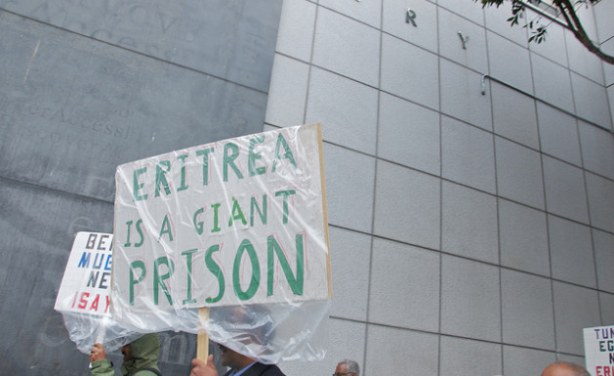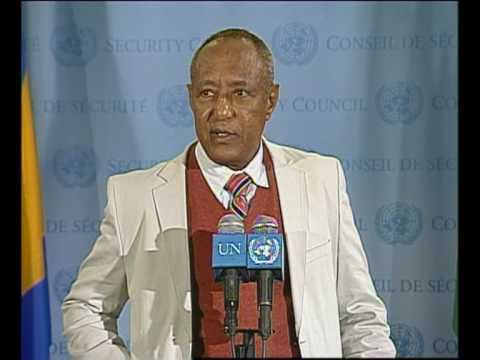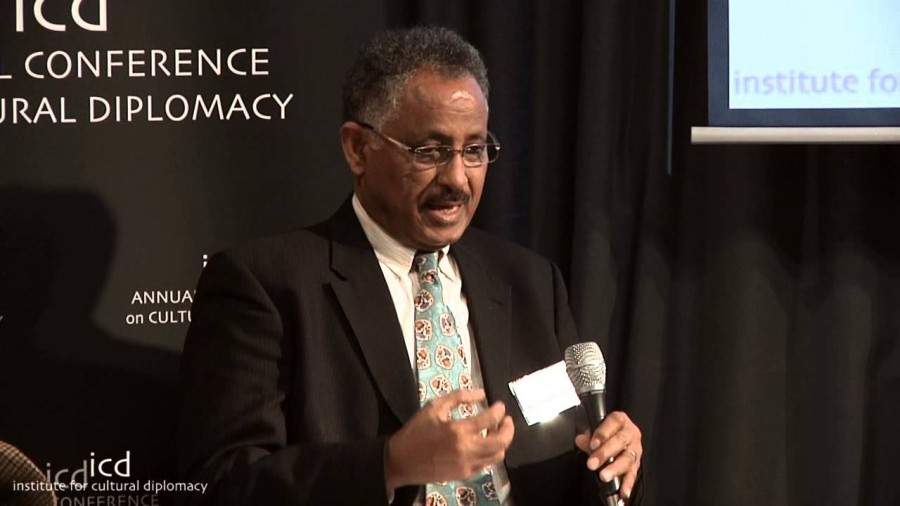By EPDP Information Office
In a statement released on 6 March 2015, a specialized committee of the UN Human Rights Council criticized the Eritrean regime for not respecting women’s rights that are well enshrined in a convention that the Asmara regime itself has already signed.
The committee scrutinizing failures in the implementation the Convention to Eliminate all forms Discrimination against Women (CEDAW) discussed women’s situation in Eritrea. Also discussed was a report from the Eritrean delegation at the meeting that was presented on 26 February 2015.
 Dr Daniel Rezene represents Eritrean Law Society at Geneva meeting on women’s rights
Dr Daniel Rezene represents Eritrean Law Society at Geneva meeting on women’s rights
Concluding observations of the Committee on Discrimination against Women contain serious concerns about the absence of rule of law in Eritrea with an elected National Assembly and fully implemented constitution which the basic necessities for protection and promotion of human rights, like women’s rights stated in the Convention (CEDAW).
The committee could not expect any improvement in the Eritrean women’s situation before steps are taken to the rule of law in the country.
Prevalence of sexual abuse of women in the Eritrean army, absence of criminal action against sex offenders, the open-ended “national service” that force women and families to escape from the regime, and the presence of small arms at every corner in the country were mentioned among the concerns of the committee that believed they should be addressed “as a matter of high priority”. (See link
http://tbinternet.ohchr.org/_layouts/treatybodyexternal/SessionDetails1.aspx?SessionID=901&Lang=en - scroll down to see Eritrea)
Dr. Daniel Rezene, an Eritrean democracy and human rights activist residing in Switzerland, actively participated in the discussions and made written and oral presentations representing the Eritrean Law Society (ELS). Below are excerpts from the CEDAW committee meetings concluding observations and the oral presentation made by Dr. Daniel Rezene at one of the committee meeting:
From CEDAW Observations:
6: The Committee considers that the indefinite national service, the ineffective implementation of the 1997 Constitution and the suspension of the National Assembly, have resulted in a deterioration of the rule of law and resulted in a serious refugee crisis which pose a challenge to the implementation of the Convention. Therefore the Committee urges the State party to implement the recommendations contained in the present concluding observations as a matter of high priority.
8(e): Concerned about [t]he proliferation of small arms and the accessibility of firearms to individuals in the framework of the national service and their impact on the security of women.
9(b): Prevent, investigate, prosecute in criminal courts, and punish all cases of violence against women and girls in the national service and at the Sawa Military Training Centre, implement a policy of zero tolerance and provide legal aid, rehabilitation programmes and compensation to victims;
11(a): Ensure the effective implementation of the 1997 Constitution of Eritrea and expedite the planned Constitutional review process, within a clear timeframe and with transparent procedures …
13(b): Ensure that all cases of violence and discrimination against women covered by the Convention are brought under the jurisdiction of criminal instead of military courts, including when violations of the law are committed by military or public officials;
20(c): Alleged perpetrators of sexual violence against women in the national service are rarely prosecuted.
22. …it is concerned about reports that numerous women and girls, including unaccompanied children who are fleeing the country become victims of human trafficking and smuggling.
24. …it is concerned that women remain underrepresented in senior government positions and at reports that the measures taken only benefit women sharing the views of the political party in power.
25(b): Expeditiously hold free and fair elections to the National Assembly and other elected bodies, ensuring that all women, including those from disadvantaged groups and those holding divergent opinions, can vote and stand for election;
49: It also invites the State party to consider ratifying the Rome Statute of the International Criminal Court [other international treaties].
Dr. Daniel Rezene’s Comments:
“I am presenting this oral statement on behalf of the Eritrean Law Society (ELS), an association of Eritrean legal professionals, working from exile. In addition to providing a context to the overall crisis of rule of law in Eritrea, our oral presentation focuses on three major issues: the issue of sexual violence in the army, the problem of human trafficking and the dire of state of women and unaccompanied refugee children in neighbouring countries.
“One of the most pervasive problems in Eritrea is the issue of sexual violence that is committed with impunity by military commanders. As is widely known, the government has a sweeping policy of compulsory military conscription, known as National Service Programme. Accordingly, every adult of member of the Eritrean society, including women, are subject to unpaid and indefinite military conscription by which reason many Eritreans are fleeing the country in unprecedented scale, making Eritrea one of the leading refugee-producing countries in the world.
“In the context of the government’s sweeping militarization agenda, many women conscripts have been victimised by sexual violence committed with impunity by army commanders. The problem is complicated by the total breakdown of the rule of law. In Eritrea, the whims and actions of military commanders are above the law. This means, access to justice with regard to sexual violence is unthinkable. The victims of this form injustice are estimated in thousands.
“The other issue is that of human trafficking. Due to a long history forced migration, Eritrea is also a major origin of victims of human trafficking. Eritrean victims make the majority of victims of the human trafficking crisis in the Sinai Desert of the last 4 to 5 years. Many of these Eritrean victims are women, who are wantonly raped and subjected to all sorts of abuses. In the first place, they have been forced to flee Eritrea as a result of severe political repression, pervasive practice of sexual violence and a dire state of socio-economic crisis. After feeling Eritrea, they fall in the hands of merciless human traffickers, and this means effectively jumping from the frying pan into the fire. Related to this issue is that of thousands of refugees, including unaccompanied underage boys and girls, in neighbouring countries of Ethiopia and Sudan. Their plight requires urgent attention.
“Madame Chairperson, what makes the case of Eritrea unique from many other countries is that it has no working constitution, no opposition political party, no functioning parliament, no form of free press, no form of civil society organizations (except GONGOs). To our knowledge, there is no other country in the world that is helplessly stifled bysuch kind of multiple structural problems all at once.The predicament of Eritrea is exceptionally unique. That is why the country has alarmingly high number of victims of human rights violations, estimated in tens of thousands. And this includes victims of sexual violence.
“As we speak now, the Eritrean government is under comprehensive scrutiny by a Commission of Inquiry established last year by UN Human Rights Council, here in Geneva. To our knowledge, Eritrea is the only African country (after Libya) to have been a subject of investigations of this nature. And this is happening sadly in the absence of any sort of armed conflict in the country. From this, it is not difficult to imagine the level of political repression and the dire state of women’s right in in the country.
“In conclusion, Madame Chairperson, we would like to highlight that the prevailing situation in Eritrea is a portent of much worse to come. This is how it looks like when a nation is at the brink of a state failure. Anyone with a right conscience cannot feign ignorance about the deep-seated political crisis in the country. We therefore kindly urge the CEDAW Committee to adopt recommendations that are commensurate with the reality at the ground level”.
 The meeting was to be opened by Mr Elias Habte Selassie (an Eritrean academician, lawyer and an expert in conflict resolution and development) and closed by Dr Asefaw Tekeste. (Public Health Director School of Medicine Touro University )
The meeting was to be opened by Mr Elias Habte Selassie (an Eritrean academician, lawyer and an expert in conflict resolution and development) and closed by Dr Asefaw Tekeste. (Public Health Director School of Medicine Touro University )




 Dr Daniel Rezene represents Eritrean Law Society at Geneva meeting on women’s rights
Dr Daniel Rezene represents Eritrean Law Society at Geneva meeting on women’s rights

 MP
MP



















